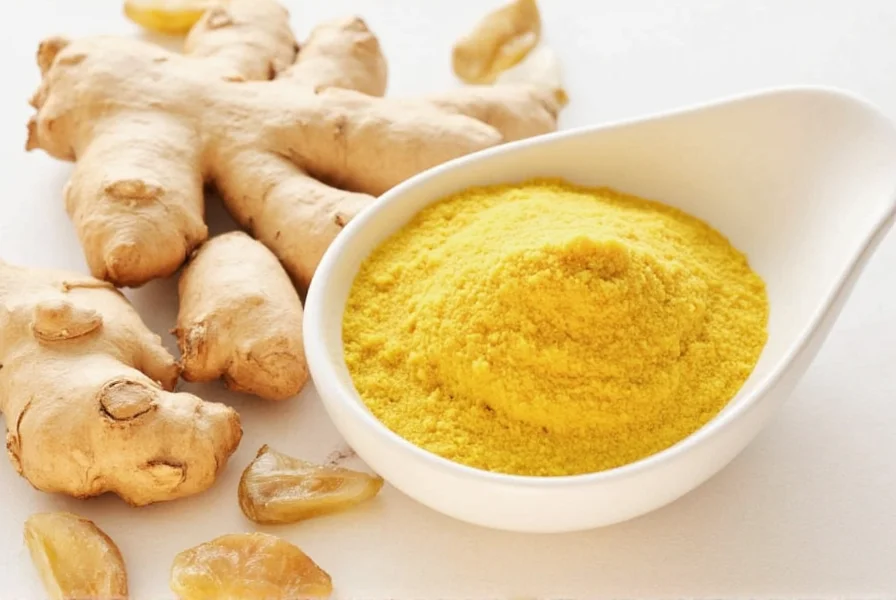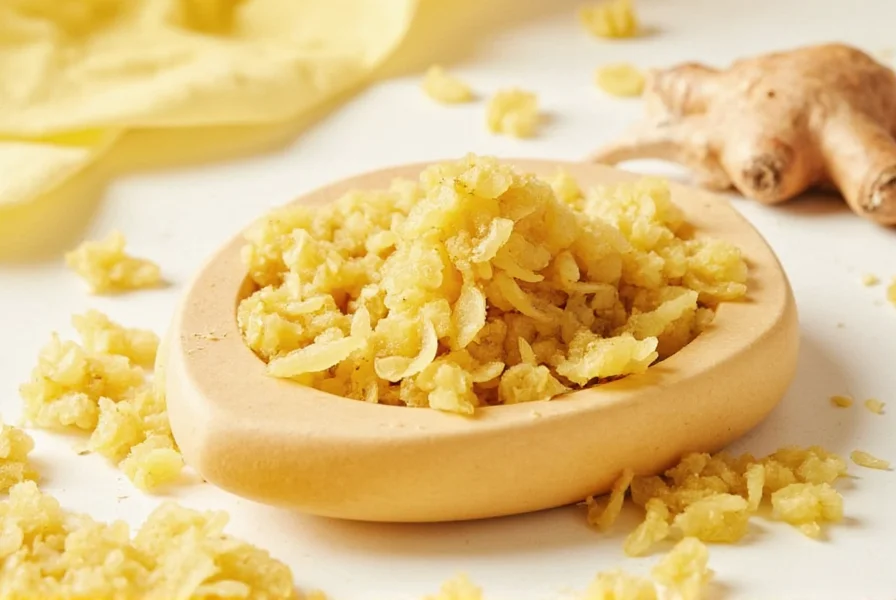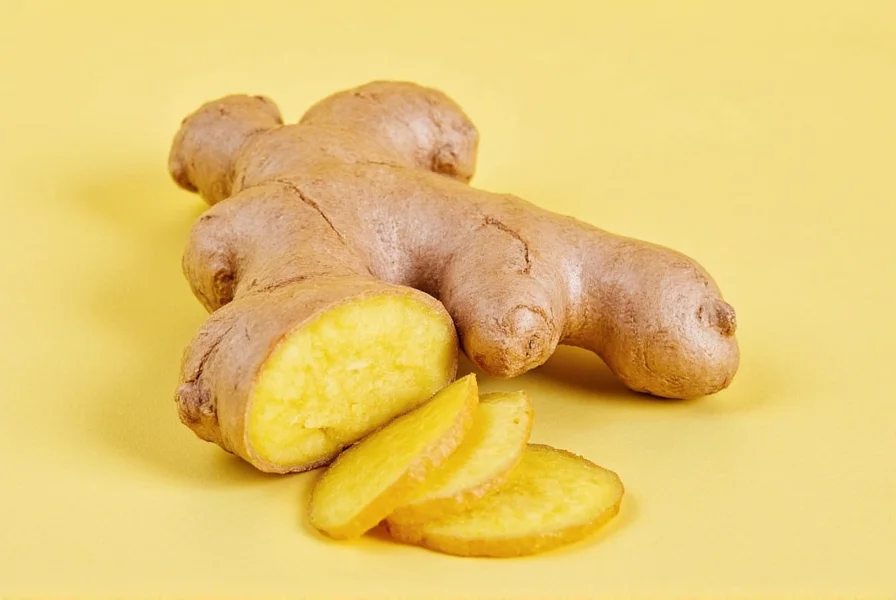Ginger extract offers a concentrated form of ginger's therapeutic compounds, providing measurable health benefits supported by scientific research. Unlike fresh ginger, standardized extracts deliver consistent levels of active components like gingerols and shogaols, making them valuable for specific health applications. This comprehensive guide examines the evidence behind ginger extract's benefits, proper usage, and safety considerations based on current clinical research.
What Is Ginger Extract and How Is It Made?
Ginger extract comes from the rhizome of Zingiber officinale through various extraction methods that concentrate its bioactive compounds. The extraction process significantly impacts the final product's composition and effectiveness.
| Extraction Method | Key Characteristics | Gingerol Concentration |
|---|---|---|
| Supercritical CO2 | Purest method, no solvent residues | High (6-8%) |
| Ethanol extraction | Common commercial method | Moderate (4-6%) |
| Water extraction | Traditional method, lower concentration | Low (1-2%) |
Standardized extracts typically contain 4-5% gingerols, the primary bioactive compounds responsible for ginger's therapeutic effects. The extraction method affects not only potency but also the balance of various ginger compounds that work synergistically.
Key Bioactive Compounds in Ginger Extract
Ginger's therapeutic properties stem from several bioactive compounds, with gingerols being the most significant. When ginger is processed or dried, gingerols transform into shogaols, which have different but complementary effects.
Gingerols demonstrate potent anti-inflammatory properties by inhibiting COX-2 and 5-LOX enzymes, similar to non-steroidal anti-inflammatory drugs but without the same side effect profile. Shogaols show stronger antioxidant activity and may enhance ginger's anti-nausea effects. Additional compounds like zingerone contribute to ginger's overall therapeutic profile.
Evidence-Based Health Benefits
Multiple clinical studies validate ginger extract's effectiveness for specific health conditions. The strongest evidence supports its use for nausea management.
Nausea and Vomiting Relief
Research consistently shows ginger extract's effectiveness for various forms of nausea. A meta-analysis of 12 studies involving over 1,200 participants found ginger extract significantly reduced pregnancy-related nausea compared to placebo. For postoperative nausea, ginger extract at 1 gram taken before surgery decreased incidence by 38% compared to controls.
Ginger extract for nausea relief works through multiple mechanisms, including acceleration of gastric emptying and modulation of serotonin receptors in the digestive tract. Unlike pharmaceutical antiemetics, ginger typically causes fewer side effects like drowsiness.
Anti-Inflammatory and Pain Relief Properties
Ginger extract anti-inflammatory benefits make it valuable for managing osteoarthritis and muscle pain. In a 12-week study of 247 osteoarthritis patients, those taking 255 mg of ginger extract twice daily reported 30% greater pain reduction than the placebo group.
The anti-inflammatory effects appear dose-dependent, with optimal results seen at daily doses of 1-1.5 grams. Ginger's mechanism differs from conventional NSAIDs, potentially offering a safer long-term option for inflammation management.
Recommended Dosage Guidelines
Effective ginger extract dosage varies based on the intended use and extract concentration. Clinical research provides evidence-based recommendations:
- Nausea relief: 1-1.5 grams daily, divided into 2-3 doses, starting before expected nausea onset
- Osteoarthritis pain: 255 mg standardized extract twice daily (providing approximately 10 mg gingerols)
- General anti-inflammatory support: 1 gram daily of 4% gingerol standardized extract
For ginger extract for morning sickness, studies show effectiveness at 250 mg four times daily, though pregnant women should consult healthcare providers before use. The best ginger extract dosage depends on individual factors including health status and specific needs.

Safety Profile and Potential Side Effects
Ginger extract is generally well-tolerated, but understanding potential side effects is crucial. Most adverse effects occur at higher doses exceeding 4 grams daily.
Common mild side effects include heartburn, mouth irritation, and gastrointestinal discomfort. People with gallstones should consult physicians before use, as ginger may increase bile production. Those taking blood thinners should exercise caution due to ginger's mild antiplatelet effects.
Ginger extract safety during pregnancy appears favorable for nausea management at standard doses, though some practitioners recommend avoiding it during the first trimester. Always consult healthcare providers before using ginger extract if you have medical conditions or take medications.
Ginger Extract vs Fresh Ginger: Understanding the Differences
Ginger extract vs fresh ginger presents important considerations for therapeutic use. While fresh ginger contains the same compounds, extracts offer standardized potency and convenience.
One teaspoon of fresh ginger contains approximately 2-4 mg of gingerols, whereas a standardized 500 mg ginger extract capsule typically provides 25 mg of gingerols. This concentration makes extracts more practical for therapeutic dosing. However, fresh ginger contains additional compounds that may contribute to its overall effects.
For specific therapeutic applications like severe nausea or chronic inflammation, ginger extract provides more reliable dosing. For general culinary use or mild digestive support, fresh ginger remains an excellent option.
Choosing Quality Ginger Extract Products
Selecting high-quality ginger extract requires attention to several factors. Look for products that specify the gingerol content (typically 4-5% for standard extracts) and indicate the extraction method used.
Third-party testing verification from organizations like USP, NSF, or ConsumerLab provides assurance of product quality and purity. Avoid products with excessive fillers or unnecessary additives. The best ginger extract supplements will clearly state the amount of active compounds per serving rather than just total ginger root content.

Current Research and Future Directions
Scientific studies on ginger extract continue to expand our understanding of its mechanisms and potential applications. Recent research explores ginger's effects on metabolic health, with some studies suggesting benefits for blood sugar regulation.
Emerging evidence indicates ginger extract may support exercise recovery by reducing muscle soreness. Other promising areas include cognitive health and certain types of digestive disorders. However, more large-scale human trials are needed to confirm these potential benefits.
Practical Applications and Usage Tips
For optimal results with ginger extract, consider timing and formulation. Enteric-coated capsules may reduce potential gastrointestinal irritation. Taking ginger with food can minimize stomach discomfort while maintaining effectiveness.
For acute nausea, starting with a full dose at symptom onset works best. For chronic conditions like osteoarthritis, consistent daily use yields better results than intermittent dosing. Understanding how ginger extract works in the body helps optimize its therapeutic application.
Conclusion
Ginger extract represents a valuable natural remedy with substantial scientific backing for specific health applications. Its effectiveness for nausea relief, anti-inflammatory benefits, and pain management makes it a worthwhile consideration for many individuals. When selecting ginger extract supplements, prioritize standardized products with verified gingerol content from reputable manufacturers. As with any supplement, consult healthcare providers to ensure appropriate use based on individual health circumstances and potential medication interactions.
What is the most effective dosage of ginger extract for nausea relief?
Research shows that 1-1.5 grams of ginger extract daily, divided into 2-3 doses, provides optimal nausea relief. For pregnancy-related nausea, studies used 250 mg four times daily. The effectiveness depends on the extract's gingerol concentration, with standardized extracts containing 4-5% gingerols showing the best results in clinical trials.
How does ginger extract compare to fresh ginger in terms of health benefits?
Ginger extract provides concentrated, standardized levels of active compounds like gingerols, typically offering 10-20 times more potency than fresh ginger. While fresh ginger contains the same compounds plus additional phytonutrients, extracts deliver consistent therapeutic dosing. One 500mg standardized ginger extract capsule (4% gingerols) provides approximately 25mg of gingerols, whereas one teaspoon of fresh ginger contains only 2-4mg.
Are there any significant side effects associated with long-term ginger extract use?
Ginger extract is generally safe for long-term use at recommended doses (up to 1.5 grams daily). Some people may experience mild heartburn or gastrointestinal discomfort. At very high doses (over 4 grams daily), potential blood-thinning effects may occur. Those with gallstones should consult a physician, as ginger may increase bile production. No serious adverse effects have been documented in studies lasting up to 12 weeks.
Can ginger extract interact with common medications?
Ginger extract may interact with blood-thinning medications like warfarin due to its mild antiplatelet properties. It could potentially enhance the effects of diabetes medications by lowering blood sugar. Those taking hypertension medications should monitor blood pressure, as ginger may have mild blood pressure-lowering effects. Always consult your healthcare provider before combining ginger extract with prescription medications to avoid potential interactions.
Frequently Asked Questions
What is the most effective dosage of ginger extract for nausea relief?
Research shows that 1-1.5 grams of ginger extract daily, divided into 2-3 doses, provides optimal nausea relief. For pregnancy-related nausea, studies used 250 mg four times daily. The effectiveness depends on the extract's gingerol concentration, with standardized extracts containing 4-5% gingerols showing the best results in clinical trials.
How does ginger extract compare to fresh ginger in terms of health benefits?
Ginger extract provides concentrated, standardized levels of active compounds like gingerols, typically offering 10-20 times more potency than fresh ginger. While fresh ginger contains the same compounds plus additional phytonutrients, extracts deliver consistent therapeutic dosing. One 500mg standardized ginger extract capsule (4% gingerols) provides approximately 25mg of gingerols, whereas one teaspoon of fresh ginger contains only 2-4mg.
Are there any significant side effects associated with long-term ginger extract use?
Ginger extract is generally safe for long-term use at recommended doses (up to 1.5 grams daily). Some people may experience mild heartburn or gastrointestinal discomfort. At very high doses (over 4 grams daily), potential blood-thinning effects may occur. Those with gallstones should consult a physician, as ginger may increase bile production. No serious adverse effects have been documented in studies lasting up to 12 weeks.
Can ginger extract interact with common medications?
Ginger extract may interact with blood-thinning medications like warfarin due to its mild antiplatelet properties. It could potentially enhance the effects of diabetes medications by lowering blood sugar. Those taking hypertension medications should monitor blood pressure, as ginger may have mild blood pressure-lowering effects. Always consult your healthcare provider before combining ginger extract with prescription medications to avoid potential interactions.











 浙公网安备
33010002000092号
浙公网安备
33010002000092号 浙B2-20120091-4
浙B2-20120091-4